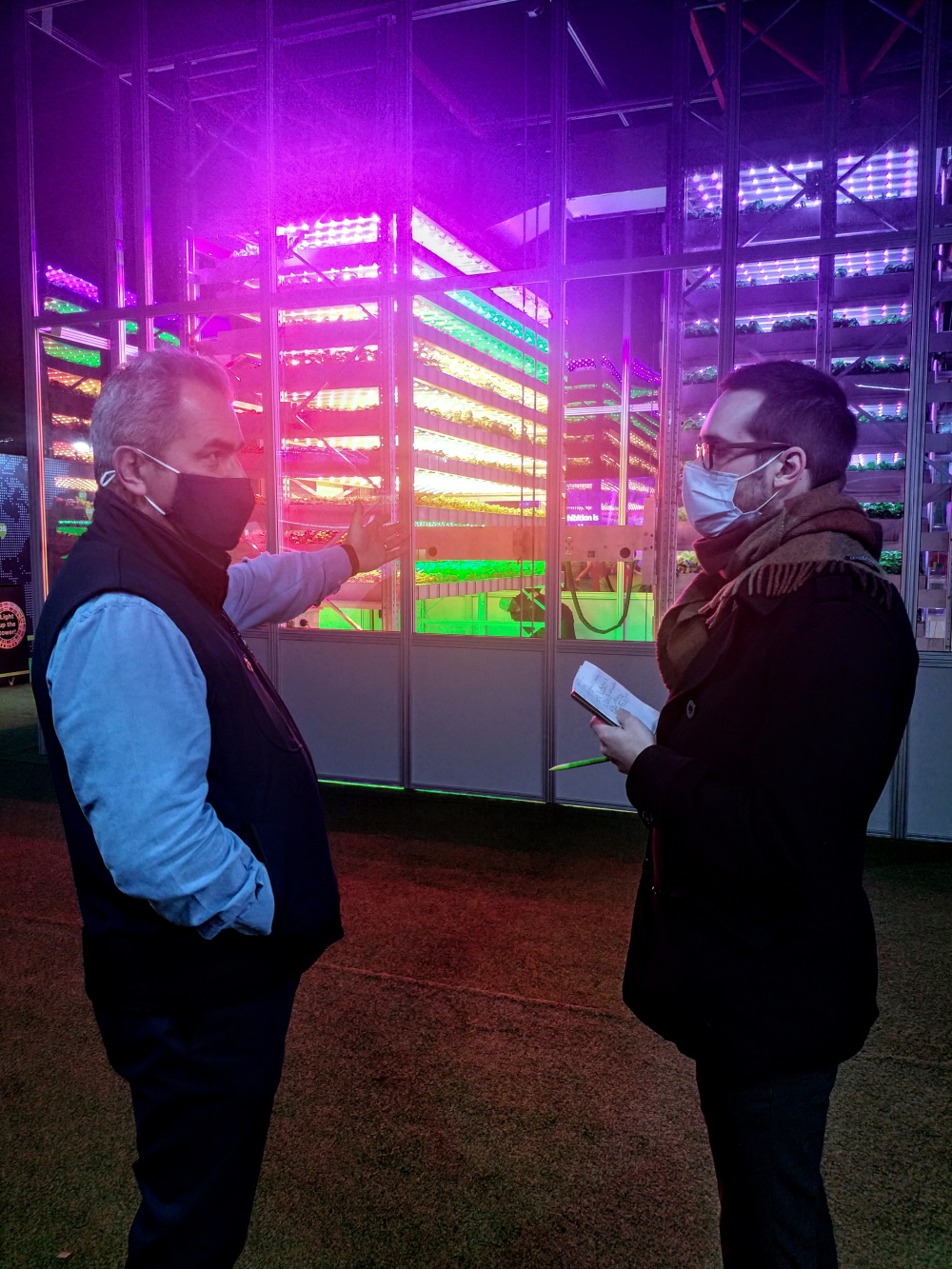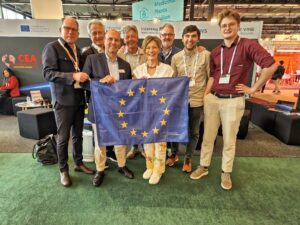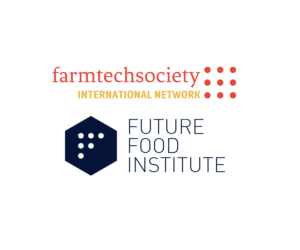Strawberries, green chards, small pine trees, basils and whatnot—orderly nested on grow trays under dazzling LED lights, stacking up skywards into six-meter high towers. Intelligent Growth Solutions’ (IGS) immersive vertical farming exhibition during COP26 in Glasgow provided a good understanding and look at the advanced technologies and innovations in food production and potential transformation towards decarbonization and sustainability in agriculture.
"Rural farmers are the easiest people to do business with”
David Farquhar, CEO Tweet
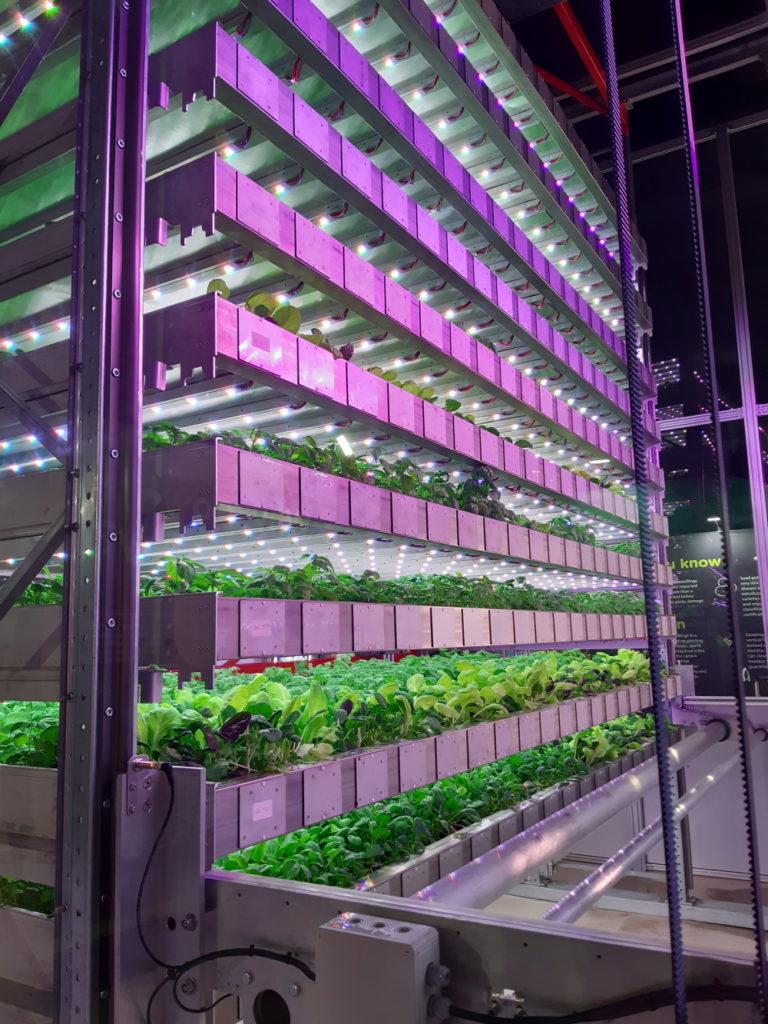
Founded in 2013, IGS is a vertical farming (VF) technology company, providing indoor food production systems to customers on four continents. The IGS team had the privilege to get a major pavilion at the Sustainable Glasgow Landing, amidst a constellation of COP events devoid of any agri-food topics & stakeholders. A nascent Scottish pride that made it to wide national media coverage and caught a lot of attention from the public and decision-makers.
FarmTech Society attended COP26, notably to visit the VF exhibition of its members IGS and bring attention to the importance of improving agriculture, one of the biggest emitters of greenhouse gas. FarmTech Society is an international non-profit industry association that unites and supports the Controlled Environment Agriculture (CEA) industry, seeking to strengthen the sector through the development and implementation of resilient and future proof methods and
Vertical Farming & Controlled Environment Agriculture
VF is one the practices included under the wider practice of CEA, the fundamental principle of which lies in creating and monitoring optimal growing conditions for plants, rather than wrestling with nature’s uncontrollable and unpredictable climates. CEA similarly encompasses greenhouses and container farms. Growing plants indoors and controlling all relevant parameters offer multiple benefits in terms of resource-efficiency, water usage (up to -90% compared to field agriculture), land usage and reduction or even absence of pesticides. CEA farmers grow more with less while engaging with tangible solutions for climate adaptation & mitigation in agri-food systems
Deepening the roots, widening the horizon
IGS publicly announced its £42 million Series B fundraise amidst COP26. Originally aiming for 15 million, the one-year fundraising process attracted interests from general and family funds looking for sustainable investments, such as COFRA AG (Switzerland), Cleveland Avenue LLC (Chicago) and DC Thomson (Scotland). This growing enthusiasm is strengthening the case of CEA as a sustainable investment, while much remains to be done. The CEA industry should engage in current developments in the context of sustainable financing, particularly the globally significant EU Taxonomy*, to promote CEA solutions.
*Around €600 Bn will be dedicated from 2022 to 2027 to investments listed under EU Taxonomy. The Sustainable Financing Platform will address the criteria for CEA during the first half of 2022. FarmTech Society will work with its members to represent the interests and on-site realities of the CEA industry.
A wider, more diverse,and well-trained employee base comes with more opportunities seized at all levels. Andrew Loyd, COO of IGS, already has some plans as to where to apply these new funds and human resources.
- Climate change will directly affect communities around the world to meet their food demand, the safe supply of which CEA can help to bring with consistency and reliability.
- All stakeholders of this emerging industry are in dire need of more knowledge and experience to grow more plants indoors. This will also unlock new markets with different pallets.
- As a technology provider, IGS is also focused on making its growth towers more deployable, flexible and scalable for the customers’ specific needs and demands.
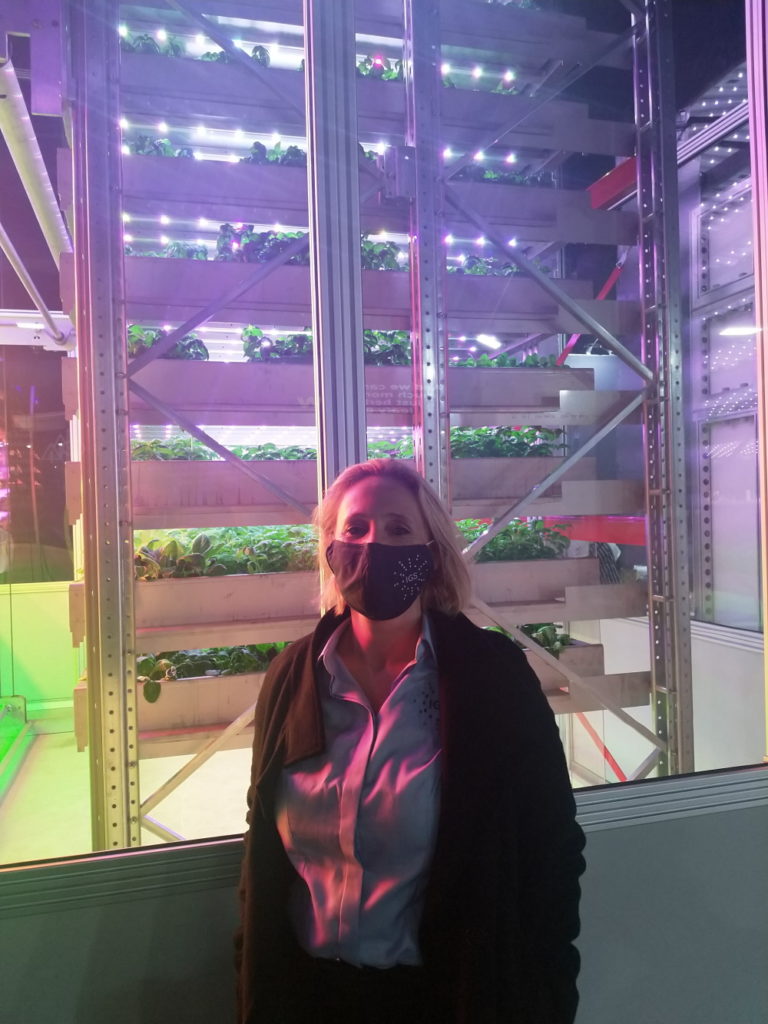
Technology yes, Frankenstein food no
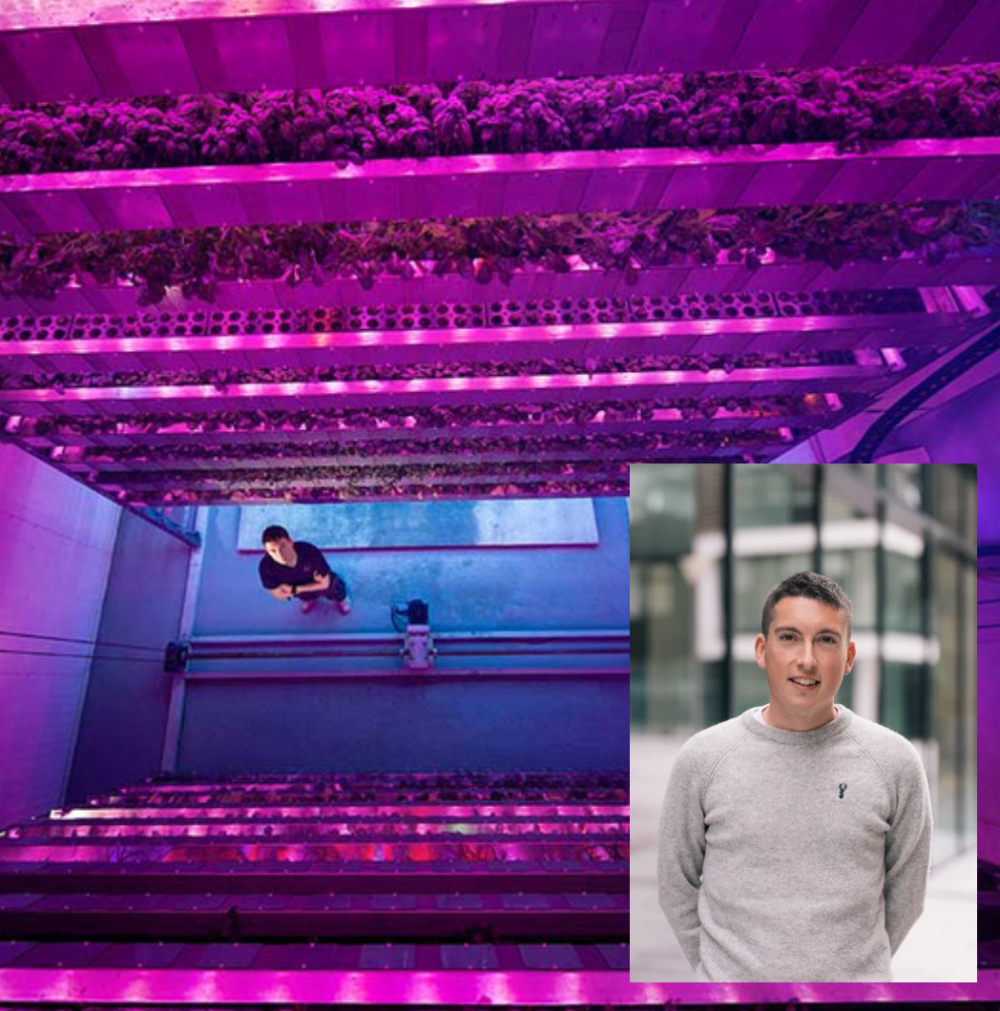
The success of IGS over the past two years also relies on state-of-the-art indoor-growing technologies and innovations. IGS’ lighting technology providers, Osram, commercializes unique LEDs called “three-phase” lighting systems. This allows for enhanced energy-efficiency (up to 40%), the light’s granularity and interesting synergies with renewable energy grids.
The LED technology is at the core of the modularity and the flexibility of IGS’s VF system, explains Dave Scott. Co-founder & chief technology officer of IGS, he has been working on the entire system for over 8 years and knows all its ins and outs. He stresses that the light granularity is one of the key elements of growing plants indoors.
“Plants are the least known thing in science”
Dave Scott, CTO Tweet
For Dave, more than developing better industry 4.0 solutions in CEA, the real improvement potential lies in deepening the knowledge of plant biology—”Plant is the least known thing in science.” The seeds, crops, stages of growth, different types of stress reaction, etc remain mysterious. “The variables are beyond infinite,” he adds, highlighting IGS’ research projects to broaden the understanding of growth recipes and find new ones.
The world’s current energy emergency is also reshaping IGS’ research agenda. A greater emphasis is consequently placed on the integration of their VF systems into renewable energy grids, which echoes with FarmTech Society’s Renewable Energy Transition Pilot Project in Germany. Essentially, vertical farms can complement grid stability issues, while balancing energy demand. Not only does it bolster commercial viability for VF growers by reducing the energy price outside peak times, with no consequences for the plants, but it also works as a buffer for the grid when there is a surplus of energy available, hence diminishing the risk of energy price deflation.
Education, education & rural communities
“This exhibition is about education” summed up David Farquhar, CEO of IGS since 2017. Education of the people about sustainable food systems delivering healthy and safe produce. Education of policy-makers about the available options to address climate change, loss of biodiversity, and ecosystems’ degradation while reinvigorating regional economies. Several politicians and high public servants visited the exhibition, like Nicola Sturgeon, First Minister of Scotland or Tom Vilsak, the US Secretary of Agriculture.
The relevance of CEA to tackle environmental, social and economic issues has surprisingly made its way to the ears of the current government in place. The Scottish National Party, which now holds a parliamentary majority, has explicitly mentioned the need to develop “vertical low-carbon farms” in its 2021 Manifesto. Accordingly, the Scottish government is holding a consultation on local food strategies, stretching until December 2nd, with a dedicated section for VF. David promises to deliver a strategy, coordinated among IGS’ different teams, to be communicated with policy-makers.
On another front, IGS is widening the narratives to take CEA to the countryside. Most indoor farms so far have been concentrated in peri-urban areas, where there is sufficient space as well as conveniently re-usable former brownfields and abandoned buildings. However, unlocking all of CEA’s environment, economic and social benefits entails cooperating with all agri-food stakeholders. This is the only route to shape competitive, sustainable, inclusive and resilient food systems.
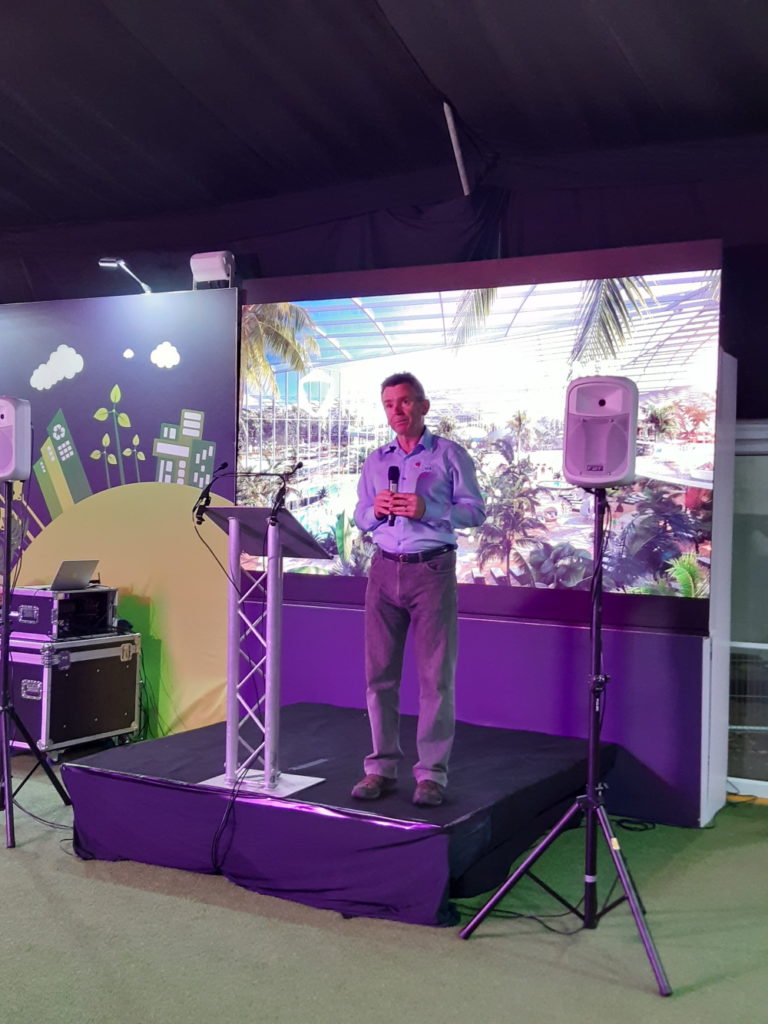
IGS has been partnering with rural farmers to create sustainable hybrid solutions. One consists in establishing vertical farms as tree and plant nurseries. David explains that probably the most broken limb of conventional agriculture is its capacity to cultivate seeds into seedlings that can then be transplanted into outdoor fields. The wastage rate is close to two thirds for trees, while it is around 40% for strawberries and blueberries. VF’s seedlings face a wastage rate below 5%, effectively generating economic and time gains on growers and nursery companies.
when small pine seedlings mingle with strawberries.
The CEA industry is just at the dawn of its momentum. While much remains to be done, some stakeholders are finally gaining well-deserved recognition for their innovativeness and contribution for economic, social and environmental sustainability, like IGS.
The company has other projects up its sleeves, like the recently announced international partnership with Therme RPC, labelled Therme IGE (Intelligent Growth Ecosystems), or new research programs that should be around the corner of this year. And of course, David Farquhar hopes to reproduce this successful VF exhibition in other places in the world, further educating people on viable and desirable paths for our agri-food systems.
FarmTech Society supports all its members, driving forward innovations and solutions in the CEA industry, around the needs for standardizations, education and policy. We support the unification and strengthening of the industry around standardization (data & benchmarks), education (accredited transferable certifications), and policy (recognition & market access).
Clement Cardon


